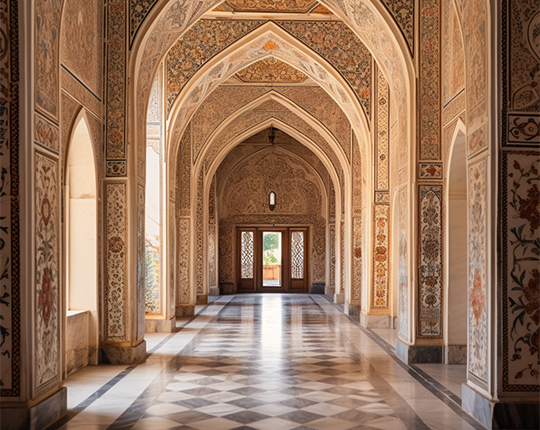Humanitarian Initiatives During Maharaja Ranjit Singh’s Reign
Maharaja Ranjit Singh, the esteemed Sikh ruler, showcased remarkable humanitarian initiatives during his reign in the early 19th century.
His vision for justice, equality, and religious tolerance left an indelible mark on Punjab’s history.
This overview delves into various facets of his governance, emphasizing his commitment to inclusivity, protection of religious diversity, economic reforms, and cultural patronage.
Religious Harmony and Tolerance:
Maharaja Ranjit Singh’s commitment to religious harmony is exemplified by his encouragement of coexistence among Sikhs, Hindus, and Muslims.
The Sikh diaspora, much like Ranjit Singh, upholds a tradition of religious pluralism, contributing to multicultural societies worldwide.
Sikh communities outside Punjab embrace his principles, fostering coexistence and respect for diverse faiths.
Unlike other rulers of his time, he refrained from enforcing Sikhism as the state religion, allowing for religious freedom. For instance, he supported the restoration of Hindu, Sikh, and Muslim places of worship, contributing to a tapestry of diversity and harmony.
Relief and Aid to Diaspora Communities:
Maharaja Ranjit Singh provided financial assistance and relief to Sikh and Punjabi communities facing hardships in foreign lands.
He sent aid to Sikh communities in Afghanistan and Central Asia who were affected by natural disasters or political turmoil.
His generosity extended to Sikh pilgrims traveling to holy sites, ensuring their safety and well-being during their journeys.
Equality and Inclusivity
The Maharaja’s governance epitomized equality and inclusivity. His cosmopolitan approach resulted in a diverse governance structure, breaking away from prevalent caste-based discrimination.
Notably, he implemented policies dismantling barriers that hindered social mobility.
The inclusive governance model of Maharaja Ranjit Singh left a lasting impression on the Sikh diaspora’s organizational structures.
Sikh communities abroad often mirror the diverse administration he pioneered, emphasizing merit-based appointments and breaking away from caste-based distinctions.
Freedom of Worship
Maharaja Ranjit Singh’s vision for religious freedom resonates in the Sikh diaspora’s commitment to practicing and celebrating Sikhism openly.
Sikh communities globally actively participate in religious festivals while engaging in interfaith dialogue, mirroring the Maharaja’s approach.
Justice and Humane Governance
Maharaja Ranjit Singh’s reign was characterized by a strong emphasis on justice and humane governance. His approach to justice was compassionate, with no capital punishment meted out during his four-decade rule.
The Maharaja prioritized public interest over personal and family ambitions, creating a governance ethos rooted in ethics and empathy.
His commitment to justice set a precedent for a compassionate rule, standing in stark contrast to the prevailing harsh practices of his time.
Even today, sikh communities actively engage in social justice movements, echoing the Maharaja’s compassionate governance ethos and commitment to public welfare.
Economic Reforms and Peasant Welfare
In the economic realm, Maharaja Ranjit Singh undertook initiatives for the welfare of peasants, redistributing land and reclaiming wastelands.
His policies aimed at enhancing agricultural prosperity and the well-being of the majority population.
The systematic policy of land redistribution resulted in around 40% of cultivators owning their land by 1839. These reforms contributed significantly to the upliftment of the agricultural community.
Initiatives supporting farmers and rural communities abroad reflect the diaspora’s commitment to economic prosperity and social justice, echoing the Maharaja’s policies.
Monetary and Economic Restructuring
Engaging with the British and participating in the world economic system, Maharaja Ranjit Singh orchestrated a complex economic restructuring.
The prosperity of Punjab derived from silver and gold earned through exports and duties on goods transiting through the kingdom.
His economic vision was attuned to the changing global dynamics, exemplified by the Treaty of the Navigation of the Indus in 1832. This engagement showcased his ability to navigate the economic challenges of his time while ensuring the prosperity of his kingdom.

Protection of Religious Sites
Maharaja Ranjit Singh contributed generously to the construction and maintenance of Sikh temples and institutions worldwide.
He donated funds for the renovation of Gurdwaras in various countries, including Afghanistan, Iran, and Hong Kong.
His support for the upkeep of mosques and other religious sites showcased his dedication to the preservation of religious heritage. For instance, he actively participated in the restoration of the Sunehri Masjid in Lahore, demonstrating his commitment to the well-being of all religious communities under his rule.
Educational and Cultural Freedom
The Maharaja’s commitment to educational and cultural freedom was evident in his support for vernacular education systems.
This allowed different communities to flourish culturally and intellectually. His patronage extended to various art forms, contributing to the rich cultural diversity of Punjab.
For instance, his support for the Kangra School of Art exemplifies how he valued and promoted cultural expressions beyond religious boundaries.
The emphasis on vernacular education aligns with the diaspora’s commitment to preserving Sikh heritage in diverse global contexts.

A true patron of art and architecture, Maharaja Ranjit Singh’s reign witnessed a cultural renaissance. His support for the embellishment of the Golden Temple, covered with gold-plated copper sheets and known as the Swaran Mandir, stands as a testament to his artistic patronage.
This architectural magnificence, marked by stone inlay and floral decorations executed by expert Muslim artisans, reflects the multi-cultural richness fostered under his rule.
The diaspora, inspired by the Maharaja’s artistic patronage, actively participates in preserving and promoting Sikh art and architecture globally.
Initiatives to beautify and maintain gurdwaras reflect the diaspora’s commitment to cultural richness and architectural magnificence.
Maharaja Ranjit Singh’s humanitarian initiatives, deeply rooted in his religious and ethical principles, created a legacy of justice, inclusivity, and respect for diversity in his kingdom.
His influence on the Sikh diaspora is profound, shaping its values, initiatives, and contributions worldwide.
His visionary leadership continues to be celebrated for fostering a society that transcended religious and cultural boundaries. His rule not only transformed Punjab economically and culturally but also set a precedent for inclusive governance that reverberates through the annals of history.
